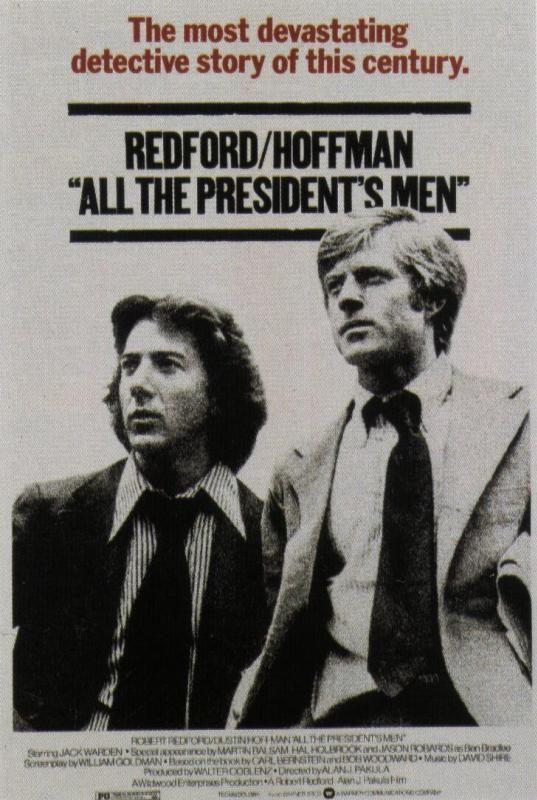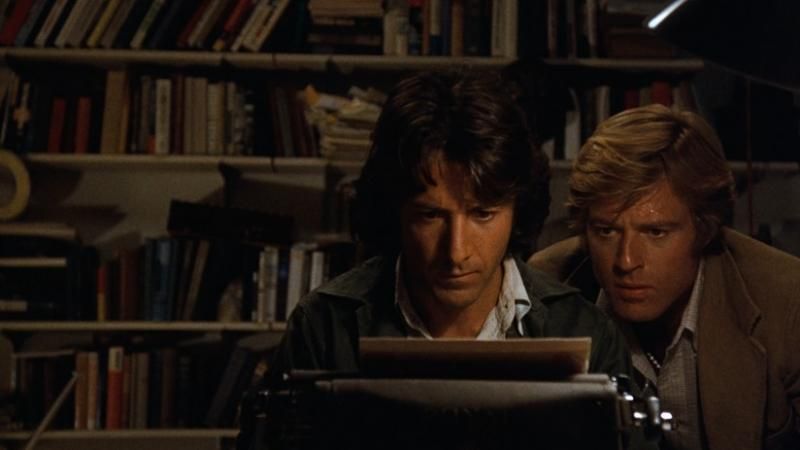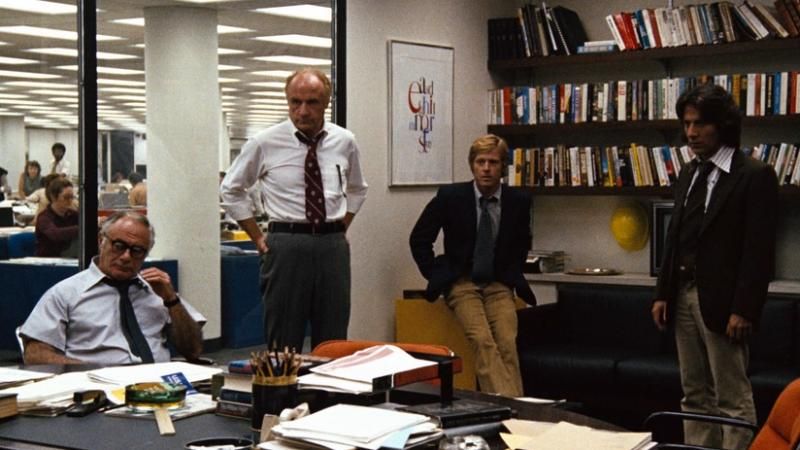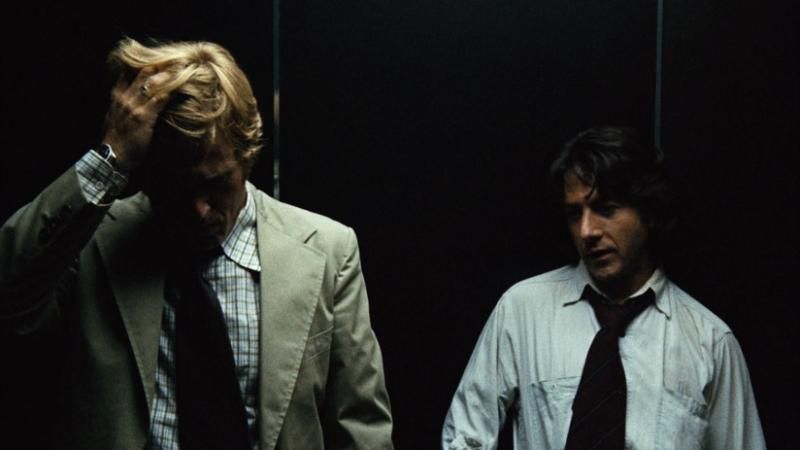All
the President’s Men
1976
Director: Alan J. Pakula
Starring: Dustin Hoffman, Robert
Redford, Jason Robards
I
will forever think of my mother whenever I watch anything with Robert
Redford. I know I have a fairly wide
fangirl streak running through me that, although it may go through periods of
dormancy, can erupt at any moment in full blown fervor (as my recent mania
obsession fascination with Sherlock
attests). After a bit of analysis, I
believe I inherited this from my mother.
I still remember watching her eyes go all glassy the first time she told
me, passionately, about her lifelong crush on Bob Redford. And this, All the President’s Men,
is one of her favorite films. For
Redford, yes, but besides Redford, it’s also a damn fine film.
Opening
with the break in at the Watergate Hotel, Washington
Post reporter Bob Woodward (Redford) attends the arraignment of the five
burglars and starts to smell a story. Post editor Ben Bradlee (Robards) also
puts fellow reporter Carl Bernstein (Hoffman) on the case, and together,
Woodward and Bernstein start chasing down leads. Problem is, no one seems to want to talk to
them, especially when it becomes clear that somehow, the Committee to Re-Elect
the President, aka CREEP, seems to be involved.
But Woodward has a source inside the White House, the infamous Deep
Throat, and that, paired with singular stubbornness, keeps the two reporters
following the money all the way to the very top.
All
the President’s Men
plays out as a thriller, which is rather unusual considering that everyone
knows how the story ends. How, then,
does it manage to make the plot compelling?
How does it manage to be so damn engaging that I actually sat up to the
edge of my seat in the last twenty minutes and shushed my husband next to me,
despite the fact that 1) I know Nixon resigned, and 2) I had SEEN the movie
before? My theory is that the film plays
on the fact that you know how it must end, and instead, strings you, the
viewer, along as it slowly, ever so slowly, builds towards the inevitable
conclusion.
It
is the very certainty of the conclusion that makes the viewer righteously
frustrated and, therefore, invested. We
know what’s going to happen; we want to watch HOW it happens. And All the President’s Men is so good
at drawing out the suspense in the logistics of the investigation. Right from the first time Woodstein (as
Bradlee calls them) try to publish a story that dares to make larger
connections beyond the simple Watergate break in, their editor Bradlee
immediately delivers a metaphorical knockout punch to the two for having soft
sources. Realistically, this is not to
punish the characters but instead to instruct the audience. This simple exchange teaches us, the viewer,
that Woodstein need to have strong sources and solid facts for the story to
run, not simply the sketch of a cover up.
A sketch won’t do, it must be concrete.
And from this point on, all the tension in All the President’s Men
is about scrapping for tiny bits of concrete evidence in a sea of reticent
witnesses.
Every
time Woodstein visits a possible source, we hold our breath. Will this be the person that finally
speaks? Every time they get a door
slammed in their face, or a person who says they can’t say anything, or someone
who clams up at the mention of The
Washington Post, it’s frustrating. And
it’s here that All the President’s Men manages to build the tension and become
a legitimate thriller. We KNOW this
story will break, it HAS to break, so for crying out loud, WHEN WILL IT
BREAK?
I
love how quiet this film is. There’s
precious little soundtrack music ever, as the film in general restricts itself simply
to in-story dialogue and sounds, and that works here. It puts the focus on the dialogue exchanges,
which is precisely where it should be in such a fact-heavy story. Yes, it’s a talking heads movie, but I tend
to really like a good talking heads flick.
The long takes also put our focus squarely on the conversations; take,
for example, a phone call scene where Woodward first starts to realize that
there is a link between the Watergate burglary and CREEP. The exchange, which involves at least three
separate phone conversation, never cuts once.
We simply watch, in a fairly tight close up, as Robert Redford talks on
the phone. And yet, that’s all we really
need. No music, no swelling score, no
percussive beats, no fancy cuts, just a few phone conversations of enormous
import, plain and simple. Granted, I
don’t think this technique always works, but it works here. Less is more.
The
production design of the film is interesting.
Made in the seventies and set in the seventies, naturally it’s all about
that particular era. And yet, the
production design is markedly restrained.
Woodstein visit many people and that involves several sets of people’s
homes, yet there is little that feels overtly, loudly seventies. Instead, there’s a lot of classic, almost
standard furniture and wardrobe that, while it doesn’t make the film feel timeless,
again serves to keep the focus not on the sets but on the dialogue exchanges.
I
did notice one thing about the production design, however: the frequent use of
three colors. Ironic, really, that a
film about the toppling of the American president should focus in on red,
white, and blue. Nearly all the
interiors – and exteriors, for that matter, given that a good deal of the film
was shot in Washington DC – are white. White
wallpapers, doors, ceilings, etc. The
brightness of the background makes the pops of color very noticeable, so when
we get the very bright red of the chairs and desks in the Washington Post workroom, it’s noticeable. When we get the bright blues, it stands
out. Nearly every set is awash in white
with pops of either bright red, bright blue, or navy. This can’t be a coincidence, instead
underlining the ironic nature of the statement.
Woodstein and their supporter, Bradlee, never once feel like traitors or
as if they are spreading an anti-American message, but the red white and blue
undercurrent serves as a reminder that yes, they are in fact in the middle of
shaking down the very core of the American government.
But
perhaps, ultimately the most astounding thing about All the President’s Men,
is that it was released a mere two years after Nixon’s resignation. The entertainment sector is certainly always
quick to jump over a juicy story, but this story is something else
altogether. It’s provocative and pulls
at threads many would rather weren’t touched at all. And what’s more, the film is good. It doesn’t feel as if it was rushed to press
in the slightest. It’s taut, thrilling,
and genuinely engaging. My mom has good
taste.
Arbitrary
Rating: 9/10





I'm always surprised at how effective this one is. I'm just barely old enough to remember Watergate, sort of. All I really remember is that the shows I liked watching were pre-empted by old guys talking for hours on end.
ReplyDeleteBut when it comes to historical drama like this, it's hard to make them interesting when the audience knows what's going to happen. And yet it really does all work. There's tension here when there sort of shouldn't be.
By the way, my mom liked Redford, but her real cinematic crush was Paul Newman.
It's amazingly taut and, as you mention, surprisingly effective. I mean, I SHUSHED my husband. STOP TALKING I HAVE TO WATCH THESE EVENTS IN A MOVIE WHOSE ENDING I ALREADY KNOW. That's something, right there.
DeleteIt's easy to understand Newman as well. Both of them, really. Newman's blue eyes and grin, Redford's classic boyish looks. I get it, I do.
I liked this movie quite a bit, too. I agree on the build of tension. It's funny to see Steve mention his memories are of shows being pre-empted because even though I'm a few years older than him that's exactly what I remember of it, too. I couldn't understand why my much older sister was interested in watching whatever the heck that was.
ReplyDeleteFor a different take on the whole story you may want to check out the comedy Dick. It shows us that is was two teenage girls hired to walk Nixon's dog who REALLY broke the Watergate scandal and who fed the story to Woodward and Bernstein. The girls are played by Kirsten Dunst and Michelle Williams. A word of warning: a guy I used to work with felt Dick was a travesty because Woodward and Bernstein were personal heroes of his. This movie makes as much fun of them as it does of Nixon.
Ha ha, I remember seeing ads for "Dick!" (That's a funny sentence taken out of context.) I have no problems with entertainment sending up most any historical character. And I like Michelle Williams. Yeah, I should give that a go.
DeleteSpeaking of using the title in a sentence, when filming wrapped they presented the two actresses with T-shirts that said something like "I did Dick all summer and I got paid for it."
DeleteI think I want that shirt.
Delete